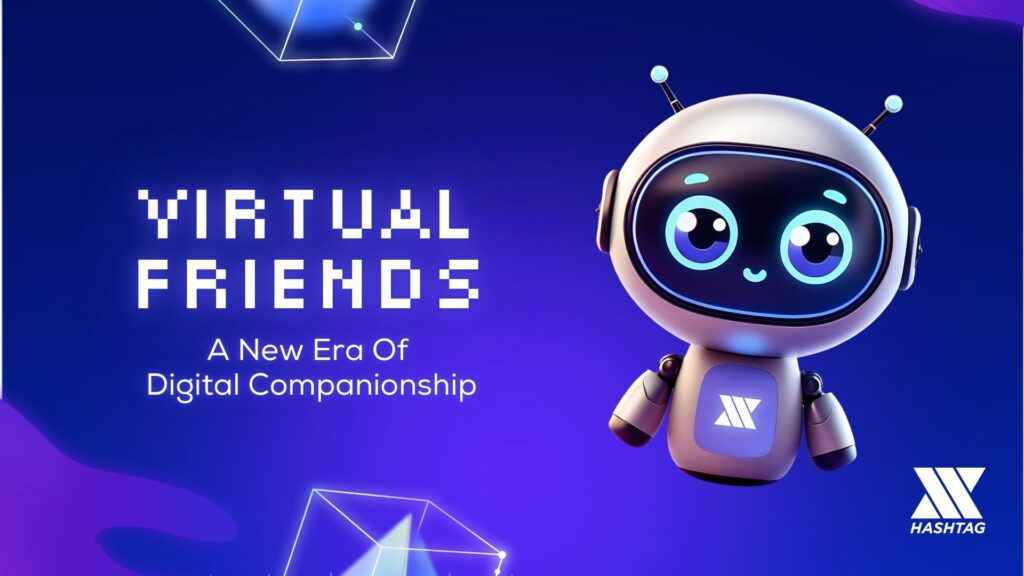In an increasingly AI enabled world, virtual friends are emerging as a significant aspect of our online interactions. These AI-powered social agents provide companionship, entertainment, and even emotional support to users across various platforms. The concept of virtual friends has evolved from simple chatbots to sophisticated AI characters capable of engaging in meaningful conversations and building connections with users.
Understanding Virtual Friends
Virtual friends, also known as Social AI agents, are digital characters designed to interact with users in a human-like manner. These agents use Large Language Models (LLMs) to understand and respond to user inputs. They can be personalized to reflect the user’s preferences, interests, and personality traits, making interactions more engaging and relevant.
xHashtag AI is leveraging the power of AI to allow users to create and interact with their virtual friends. Users can design characters and create tokens that represent the access rights to engage with these characters. The knowledge base of these virtual friends is often provided by the creator, ensuring that the interactions are informative and tailored to specific needs. The tokenization aspect adds a unique layer, allowing for ownership and trading, which can accelerate the growth and recognition of the most effective and popular virtual friends.
The Benefits of Virtual Friends
Emotional Support and Companionship: Virtual friends provide a source of emotional support and companionship, especially for individuals who may feel isolated or lonely. Studies have shown that over 60% of users report feeling more connected thanks to their virtual friends. These AI agents can engage in conversations, offer advice, and even help users manage their emotions (MDPI) (HAL Science).
Personalized Interactions: One of the key advantages of virtual friends is their ability to offer personalized interactions. By analyzing user data and preferences, these AI agents can tailor their responses to suit individual needs, making each interaction unique and meaningful.
Accessibility and Availability: Virtual friends are available 24/7, providing consistent support and companionship regardless of time or location. This constant availability is particularly beneficial for users who need immediate assistance or simply want to chat at any time of day.
Skill Development and Learning: Virtual friends can also play a role in skill development and learning. For example, language learning apps often use AI agents to help users practice and improve their language skills through interactive conversations. Similarly, virtual friends can provide educational content and resources tailored to the user’s learning pace and style.
The Impact of Virtual Friends on Society
The impact of virtual friends extends beyond individual benefits to broader society. These AI agents can help bridge the gap for those who lack social interaction, such as the elderly or individuals with disabilities. By providing a sense of connection and engagement, virtual friends can improve the overall well-being of these populations.
Moreover, the use of virtual friends in mental health care is gaining traction. AI agents can offer preliminary mental health support, monitor emotional states, and provide coping strategies. While they are not a replacement for professional therapy, virtual friends can complement traditional mental health services by providing continuous support and monitoring.
Future Prospects
The future of virtual friends looks promising, and with ongoing advancements in AI, Social AI Agents will become more sophisticated, capable of understanding complex emotions and engaging in deeper conversations. The integration of virtual reality (VR) and augmented reality (AR) will further enhance the experience, making interactions with virtual friends more immersive and realistic.
By bringing in Web3 technologies, xHashtag aims to revolutionize the way virtual friends are created, accessed, and valued. Tokenization allows users to not only interact with these digital companions but also to own and trade them. This creates a dynamic ecosystem where the most prominent and useful virtual friends can rise to the top, driven by user engagement and market dynamics. The ability to tokenize virtual friends accelerates their development and adoption, ensuring that the best AI agents are recognized and rewarded.

